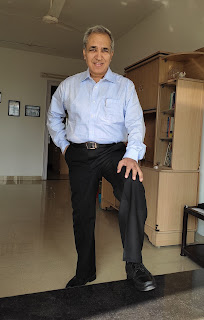Psychology of Success - Series 2
Psychology of Success
Series - 2
Have you ever stopped to ask yourself what you want out of life? What are your dreams? Whether you are heading in the right direction or not? To answer these important questions, you need to develop self-awareness - a starting point to achieve success. Self-awareness is the process of paying attention to yourself—your thoughts, feelings, and attitudes. Knowing your motivations and actions. It helps you appreciate your unique personality, skills, and interests. When you are self-aware, you can make the right choices.
 |
| Psychology of Success starts with Self-Awareness |
- Openness —imaginativeness, openness to new people, ideas, and experiences
- Conscientiousness —self-discipline, and desire to achieve
- Extroversion —assertiveness, sociability, and interest in excitement and activity
- Agreeableness —trustworthiness, warmth, and cooperativeness
- Emotional stability —resistance to negative emotions such as anxiety, anger, and depression
 |
| Each Person shows Each of the Five Traits to a Different Degree |
It is said that a person should be very intelligent to achieve success and we've heard about IQ and EQ. But there are other types of intelligence needed for success - a concept of multiple intelligences. In fact, there are eight distinct kinds of intelligence:
- Verbal/linguistic intelligence —the ability to use words and language, memorize information and create imaginary worlds • Logical/mathematical intelligence —ability in complex thinking and reasoning, using numbers, and recognizing abstract patterns • Visual/spatial intelligence —ability to visualize objects and spatial dimensions and create mental images • Bodily/kinesthetic intelligence —ability to understand and use the body and to control its motion in activities such as sports, dancing, acting, and crafts • Musical intelligence —ability to recognize rhythms, beats, and sounds, remember melodies, and distinguish background sounds • Interpersonal intelligence —ability in person-to-person communication, leadership, and conflict resolution • Intrapersonal intelligence —ability to be self-aware and self-reflective, pursue interests, and set goals • Naturalistic intelligence —ability to recognize patterns and make connections in nature, assemble collections, and identify plants and animals
'Awareness is the greatest agent for change' - quoted Eckhart Tolle. Every person having understood the significance of becoming self-aware can plan to improve his intelligence. If you want to develop Verbal/Linguistic Intelligence, you can join a book club, read voraciously or take a writing course and resolve to use a new word in your conversation every day. Similarly, if you want to enhance your interpersonal intelligence, you can plan to join a volunteer or service group and improve your verbal and non-verbal communication.
Every person has the knowledge and hone a few skills to achieve success. Knowledge is an understanding of facts or principles in a particular subject area. But skills are acquired as a result of knowledge combined with experience. For example, you might have knowledge of computers, football, botany, literature, or interior design. Knowledge is valuable, but it isn’t a skill until it is combined with real-world experience. To perform surgery, you need more than the knowledge of anatomy. You also need hands-on practice with a scalpel. And to write well, for example, you need knowledge of grammar, style, and the subject you are writing about. You also need practice in organizing your ideas and expressing yourself clearly. A transferable skill is an ability that you can use in a variety of tasks and jobs.
There is an old saying, “Find a job you love and you will never work another day in your life.” What does work mean to you? A 9-to-5 job? A mundane or stressful job? When you have a positive attitude toward work, it becomes much more than this. Work brings many rewards, Why do so many people stay in jobs they dislike? There are many reasons, including financial need, fear of change or/and a lack of aptitudes and skills that match their interests. Finding the best career requires self-awareness and self-knowledge. It is never too early or too late, to assess your values, personality traits, innate talents, skills and interests.
 |
| Putting It All Together |
My first blog on the 'Psychology of Success' was well received. And it motivated me to continue further. Self-awareness is one of the key ingredients of success. Self-awareness helps you find your direction. And in the end, there should be some takeaway message. Friends, the takeaway message is to remember ABCL. It stands for A: Awareness, B: Behavior, C: Courage, and L: Luck. Please do write your comments.
Let us inhale deeply, look forward with hope, and approach life with an open heart anew.
Presenting 'Haathon Ki Chand Lakeeron Ka' from the movie Vidhaata, where you can see two legends - Shammi Kapoor and Dilip Kumar piloting a goods train and debating between 'Takdeer' and 'Tadbeer'. Takdeer means predetermined or destined to happen, while Tadbeer is planning and execution.
Please enjoy listening to the tapping music in the beginning ...


Comments
Post a Comment